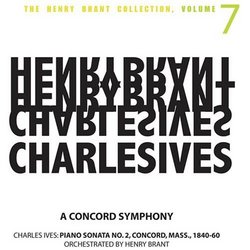| All Artists: Henry Brant, Dutch Traditional, Dennis Russell Davies, Royal Concertgebouw Orchestra Title: Charles Ives: A Concord Symphony Members Wishing: 0 Total Copies: 0 Label: Innova Records Original Release Date: 1/1/2007 Re-Release Date: 11/27/2007 Genres: Special Interest, Classical Styles: Historical Periods, Modern, 20th, & 21st Century, Symphonies Number of Discs: 1 SwapaCD Credits: 1 UPC: 726708641429 |
Search - Henry Brant, Dutch Traditional, Dennis Russell Davies :: Charles Ives: A Concord Symphony
 | Henry Brant, Dutch Traditional, Dennis Russell Davies Charles Ives: A Concord Symphony Genres: Special Interest, Classical
|
Larger Image |
CD Details |
CD ReviewsNo mere orchestration, but a wonderful, loving creation in i M. Cleveland | Albuquerque, NM USA | 11/29/2007 (5 out of 5 stars) "Henry Brant's 30-year labor of love creating this orchestral treatment of Charles Ives' masterwork for piano is a terrific synthesis of the distinctive voices of two great American composers. The orchestration is pure Brant with lots of emphasis on brass and winds. Far clearer in its lines and intent than Ive's own orchestral palette. Some may prefer the denser, murkier textures Ives created in the piano sonata and there are times when the orchestration creates a very different atmosphere than parallel passages in the original; however, this is not a "correction" of Ives. The Concord Symphony is, for me, a loving creation in its own right that stands on its own while remaining faithful to the original. Fantastic variety that matches Ives' creative scope. The "Housatonic" section in its Brant-provided livery is pure, Hollywood Americana in the best sense. The playing by the Davies-led Amsterdam band is virtuoso, concerto for orchestra stuff. Thrilling and sensitive. Highly recommended, maybe particularly for those who've never quite warmed to the piano sonata." A Brilliant Orchestration of Ives's Piano Masterpiece J Scott Morrison | Middlebury VT, USA | 01/22/2008 (5 out of 5 stars) "There are, I'm sure, purists who will balk at the very notion of an orchestration of Charles Ives's piano masterwork, the Concord Sonata. But they really ought to give this version, a 30-year-long true labor of love by Henry Brant, a hearing in its brilliant orchestral garb. I am very familiar with the Concord Sonata, having worked on it myself at the keyboard, and yet I hear things in the orchestral version that I hadn't heard before. Partly it's a matter of instrumental timbre allowing aural delineation not possible even in the best piano performances, and partly it is because Brant has chosen to emphasize things that are (at least by me) barely noticed. And hearing a familiar work in new ways is one way to keep that work alive; think, for instance, how we began to hear baroque works differently when the historically-informed-performance crowd started performing and recording things as familiar at the Bach's B Minor Mass or Handel's Messiah. As for the performance I can only say that Henry Brant, conductor Dennis Russell Davies and the Royal Concertgebouw have done themselves exceedingly proud. This is a masterful performance of this gargantuan and knotty work. For those who love this work, I urge you to try it. For those who have heard the piano sonata and didn't think they liked it, I urge YOU to try it. In Kyle Gann's words about Brant's orchestration, "He's given the world a brand-new Charles Ives symphony." Scott Morrison" Brilliant orchestration, great playing, why didn't they have D. Sills | Savage, MD United States | 03/28/2008 (3 out of 5 stars) "It is impossible for me to understand why record producers continue to do this: brilliant performances of seminal works that are recorded "live" simply because they aren't the windbag works of yesteryear that tickle the ears rather than challenge them (as Ives might well have said). I'm disgusted that $$$$ are more important to them than the artistic integrity of their work. The audience noise in this recording is not terrible, but it is far more visible in the soft spots than it should be. It would certainly never have been allowed in Tchaikovsky or Schubert.
This could have been one of the great recordings of the last half of the first decade of the new century: the orchestra was worth it, the piece was worth it, the orchestration was worth it. Why they passed up on such an opportunity I simply can't imagine. All that being said, until someone else records it in a responsible manner, this is a must-have. So $$$$ wins again, I suppose. Sigh." |

 Track Listings (5) - Disc #1
Track Listings (5) - Disc #1